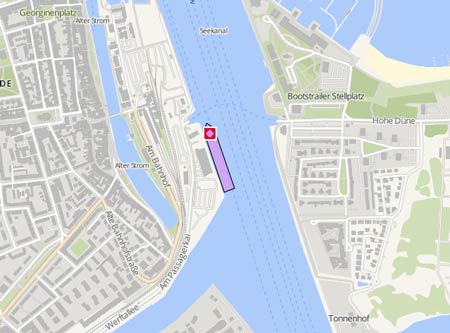HAPPY FALCON
Kurs/Position
Die letzten Häfen
Die letzten Wegpunkte
Die neuesten Nachrichten
Report into collision published
The Marine Investigation Branch (MAIB) has published an investigation report of the collision between thecargo m/v 'Scot Explorer' and the 'Happy Falcon' on Oct 24, 2023, about 12 nautical miles north -west of Thyborøn. Both vessels had departed ports in Sweden the previous day and were bound for the UK and the Netherlands, respectively. The 'Happy Falcon' had overtaken the 'Scot Explorer' overnight along the northern tip of Denmark and both vessels proceeded south-westerly along the Danish coast. At 10.12 a.m. the 'Scot Explorer' was proceeding at 12 knots on a 216° course with the master alone on the bridge, when the 'Happy Falcon', which was fine on the 'Scot Explorer'’s port bow and five miles ahead, began to slow down due to a technical fault on the main engine. At 10.18 a.m. the 'Happy Falcon' came to a stop and started to drift while repairs were being made, but the required ‘vessel NUC’ signals were not displayed; the vessel’s navigational status was not updated on the AIS, and a maritime safety information message was not broadcast. Meanwhile, the 'Scot Explorer' maintained its course and speed, with a steady bearing and decreasing range to the 'Happy Falcon'. Over the next 20 minutes, the 'Scot Explorer'’s master was undertaking other duties on the bridge and was not monitoring nearby traffic. The master made two minor course alterations with the autopilot, but this did not affect the closest point of approach (CPA) with the 'Happy Falcon', which was almost zero. At 1042, a crew member, who had been working on deck, ran to the bridge and alerted the master to the developing close-quarters situation. By then, the 'Happy Falcon' was about 200 meters away, with a CPA of 20 m in just 40 seconds. Still making good a speed of 12 kts, the master immediately used the autopilot to initiate a turn to starboard before switching to hand steering to increase the rudder angle, but the turn was not enough to avoid the collision 10 seconds later. The 'Scot Explorer'’s port side struck the 'Happy Falcon'’s starboard quarter, resulting in hull damage to both vessels above the waterline. No injuries were sustained on either vessel and there was no pollution. The MAIB’s preliminary assessment identified that: - The officer of the watch on neither vessel was keeping an effective lookout; using all available means to determine if a risk of collision existed; or acted in time to prevent a collision in accordance with the COLREGs. - Although the 'Happy Falcon' was unable to manoeuvre as required by the COLREGs or keep out of the way of another vessel, its crew had not taken the appropriate actions to inform other vessels of the situation. - The 'Scot Explorer' ’s master was alone on the bridge and distracted by other duties that interfered with keeping a safe navigational watch, contrary to Marine Guidance Note (MGN) 315 (M). - The 'Scot Explorer'’s electronic navigation aids were not being monitored, nor were they optimally set or used in accordance with the best practice described in MGN 379 (M+F). This included: - Both Electronic Chart Display and Information System (ECDIS) units were set to silent mode, with all audible alarms deactivated while underway. - Although the 'Happy Falcon' was visible on both of the 'Scot Explorer'’s radars, the target had not been acquired by an automatic radar plotting aid (ARPA). - The 'Happy Falcon'’s slowdown was not observed on board the 'Scot Explorer', despite being readily apparent on the AIS. . The absence of a dedicated lookout on the 'Scot Explorer'’s bridge meant there was no one immediately available on the bridge to assist the master as the situation developed by activating hand steering and taking the helm. This was again contrary to MGN 315 (M), which highlighted that ‘when the vessel is in automatic steering it is highly dangerous to allow a situation to develop to the point where the OOW is without assistance and has to break the continuity of the look-out in order to take emergency action’. - The initial use of the autopilot by the 'Scot Explorer'’s master instead of using hand steering to conduct the emergency manoeuvre resulted in a smaller rudder angle being used and, therefore, a slower rate of turn to avoid the collision. - The 'Scot Explorer'’s general emergency alarm was not sounded to alert the crew about the collision or activate the ship’s emergency response. Actions taken: The Chief Inspector of Marine Accidents has written to Intrada Ships Management Ltd about the standards of watchkeeping on Scot Explorer and reiterated the recommendation made following the collision between the 'Scot Carrier' and the split hopper barge 'Karin Høj' on Dec 13, 2021. The Intrada Ships Management Ltd has: - Carried out an internal investigation into this collision. - Issued a safety bulletin to its fleet about the accident and the role of the watchkeeper in ensuring safe navigation. - Written to each of its masters sharing its expectations for safe navigation. The Navigator Gas Ship Management (Denmark) ApS, the manager of the 'Happy Falcon', has: - Carried out an internal investigation into the collision. - Scheduled Bridge Resource Management refresher courses for the master and officer of the watch. - Updated its safety management system and bridge emergency checklists to include engine breakdown and actions to be taken when the vessel is unable to manoeuvre and keep out of the way of another vessel. - Updated its Bridge Resource Management procedures to ensure the bridge is appropriately manned when a vessel is not under command. - Issued a safety bulletin to its fleet about the accident and the lessons learned. - Added the lessons learned from this accident to its list of 2024 company audit topics.
News schreiben

